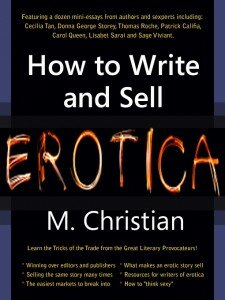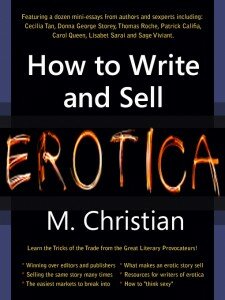When I started this gig at Write Sex, the idea was to have me write about “taboo” topics in erotica or erotic romance. You know: sex with the dead, screaming banshees, and hotty-hot vampires. As the column has progressed, I seem to usually end up writing about the mechanics of creating fiction, because as I’ve written more and more fiction over the months I’ve been doing this, I find the mechanics become all-important. Therefore, my writings here often contain pretty straightforward writing-technique observations, though they maybe laced throughout with inexplicable glimpses of my own unique mental mise-en-scene (Goth chicks! Humanities grad students! High-end hotels!).
It must have dawned on the editor and proprietor Sascha by now that I have no real intention of telling you — or perhaps I just have no capability to tell you — how to write an exquisite vampire blood-orgy romance sex scene. Sascha has, just the same, kindly refrained from docking my pay. That’s because Sascha understands what all successful writers must sooner or later understand. Your muse is not a bitch. But neither is she easy. She will gut you like a pig if you don’t listen to her. But if you meep politely now and then and blurt lots of “Yes, Ma’am” and “May I freshen your drink, Your Majesty,” there’s a small chance you’ll walk out of this business — instead, I mean, of crawling.
That’s why built into my Write Sex column was a certain breadth of scope — and without it, I’d be sunk. I wouldn’t have written this column, or the last column, or the one before that.
Because living a writing life is all about disaster preparedness. And so, after all these months, I return to the taboo — perhaps the greatest taboo of all: when shit goes wrong. Disaster preparedness is something you’ll need if you’re going to have a writing career, just as if you’re going to run a country or a city or a nuclear plant in a tsunami zone, you should probably have a spare garden hose to cool down your spent fuel rods, and you might want to consider putting your diesel tanks underground.
In writing, as in life, disasters happen. The most common writing disaster is sitting down to write and finding nothing in your brain. Almost as common is getting shit down on virtual paper — called “the computer” by these newfangled tech types — and finding it’s an absolute mess. A third kind of writing disaster is sending something out to your very best friend, your first reader, your agent, your editor or your boyfriend or girlfriend or wife or husband — and getting an “Um…huh. Okay…” in response. Or an “it sucks.” Or the most disastrous feedback of all: “I read the first page and it really seemed good, but I haven’t had time to get back to it. Maybe next week? I’ve been so busy cleaning out my fridge and LIKE-ing photos of puppies on Facebook…”
Christ! How it hurts to hear that shit! To be dismissed! Forgotten! That feeling will ream you if you let it. It will damage your spirit beyond redemption; it’ll leave your soul a smoking ruin. It’ll melt you down and send molten uranium tunneling to China. It’ll flood your Gulf with oil.
But it hurts still more to hear nothing.
By which I mean not just to hear nothing from editors, agents, first-readers, and the like. Sure, that hurts. But for me, it hurts most on the days when I hear nothing from myself. It happens all the time. It’s when my brain just goes dead, and words don’t come, and I not only don’t give a fuck if the hero and heroine ever get together — I don’t care if they lived in the first place. On days like that, my characters could drown in a levee failure or be wiped off the map by a tsunami or lose their fishing business in an oil spill, and I’d leave the computer empty and spent with nothing to show for six hours of agony, and I’d prop my feet up and watch Serenity for the umpteen-thousandth time — and tell myself, “Brownie, you’re doing a heck of a job.”
Please don’t think for a moment that I mean to make light of the fucked up crap that happens to people — whether through no fault of their own, or at least, to my mind, through no fault of the poor people, and no fault of the rich people except being so unwilling to pay taxes that cutting the budget for earthquake and volcano monitoring in somebody else’s state seems like a really good idea. In using this metaphor, I mean to minimize nobody’s suffering — real suffering, not this indulgent crap that we writers do. I don’t wish to imply that my writer’s block even begins to compare to slurping down radioactive iodine with your cornflakes, let alone taking 40 Sieverts of radiation on the chin.
On the contrary; on many of my days, writing an escapist zombie melodrama seems like a reeking load of bullshit considering how bad things are going in the world. Not having any ideas for my next warmed-over stroke fest is hardly the equivalent of having multiple cities flattened by earthquakes. I’m not suggesting that it is. Every day I’m grateful that I’ve the luxury of sitting my ass in a hard wooden chair and daydreaming about fairytales and moonbeams and whips and chains and werewolves. Every day I’m bloody grateful that a meteor hasn’t hit me — yet. Or an earthquake, a levee failure, a Mack truck, a catastrophic core meltdown…whatever. Even being able to blog about this shit is a gift from chance, or whoever. Just speaking for myself, I find that even on my worst days, my being alive to suffer so horribly is actually, God help me, appreciated.
But what I am suggesting is that when you find that creative empty, or end up with a mess of a not-quite-a-novel on your hard drive, or get yet another “It’s not for us” or “couldn’t the heroine be a juggler instead of a unicycle-acrobat?” from a publisher, it’s preparation that will save you. On those days, however bad it feels, even if it feels like the apocalypse — and oh, for fuck’s sake, some days I know it does — feeling bad about it doesn’t cool an emotional meltdown or get food or medicine to your characters who need it.
When emotional disaster strikes, you can say you never thought it could happen to you — despite mountains of evidence to the contrary. In no way, shape or form am I one of those pricks who’ll say in that case you have “only yourself to blame.” Creative emptiness feels like a tragedy, so it is a tragedy. Getting self-righteous about someone else’s pain is as reprehensible as mixing up “looting” and “finding supplies.”
But the first principle of disaster preparedness is admitting “it can happen to me.” If you’re riding high on creative success, or just pumped from drinking too much coffee, you can rest assured you’ll hit the skids at some point. If you’re the creative and spiritual equivalent of “high on life” at the moment keep in mind that life may have a special nightmare in store for you. And if you’re one of those snooty hyped-up San Francisco weirdos nobody invites to their parties who has three first aid certificates (dog, cat, and human) and knows exactly what the liquefaction will be at the base of the Bay Bridge pylons, when disaster strikes you’ll know what to do.
You’ll be the one giving CPR to werewolves hit by runaway MacGuffins.
And that’s your chance to make a difference.






Recent Comments